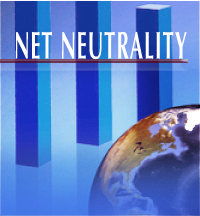Why a decentralized network is the answer to the internet “kill switch”
 |
| Source |
Douglas Ruchkoff
Reality Sandwich
The moment the “net neutrality” debate began was the moment the net neutrality debate was lost. For once the fate of a network — its fairness, its rule set, its capacity for social or economic reformation — is in the hands of policymakers and the corporations funding them — that network loses its power to effect change. The mere fact that lawmakers and lobbyists now control the future of the net should be enough to turn us elsewhere.
Of course the Internet was never truly free, bottom-up, decentralized, or chaotic. Yes, it may have been designed with many nodes and redundancies for it to withstand a nuclear attack, but it has always been absolutely controlled by central authorities. From its Domain Name Servers to its IP addresses, the Internet depends on highly centralized mechanisms to send our packets from one place to another.
The ease with which a Senator can make a phone call to have a website such as Wikileaks yanked from the net mirrors the ease with which an entire top-level domain, like say .ir, can be excised. And no, even if some smart people jot down the numeric ip addresses of the websites they want to see before the names are yanked, offending addresses can still be blocked by any number of cooperating government and corporate trunks, relays, and ISPs. That’s why ministers in China finally concluded (in cables released by Wikileaks, no less) that the Internet was “no threat.”
I’m not trying to be a downer here, or knock the possibilities for networking. I just want to smash the fiction that the Internet is some sort of uncontrollable, decentralized free-for-all, so that we can get on with the business of creating something else that is.
That’s right. I propose we abandon the Internet, or at least accept the fact that it has been surrendered to corporate control like pretty much everything else in Western society. It was bound to happen, and its flawed, centralized architecture made it ripe for conquest.
RELATED ARTICLE:
Globalists Can Win Cyber War, But Not Info War


Be the first to comment on "The Next De-Centralized Internet"